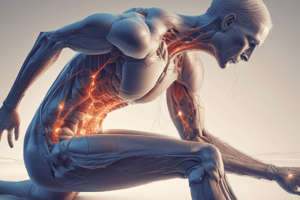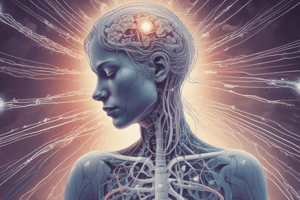Podcast
Questions and Answers
Explain the impact of OxyContin on the life of the individual mentioned in the text.
Explain the impact of OxyContin on the life of the individual mentioned in the text.
OxyContin is described as saving the individual's life, allowing her to perform daily tasks while dealing with immense pain and emotional distress. The individual acknowledges the possibility of being addicted to OxyContin but emphasizes its crucial role in keeping her alive and preventing thoughts of ending her life.
What is the historical context of opioids, specifically regarding opium and morphine?
What is the historical context of opioids, specifically regarding opium and morphine?
Opium has been cultivated since the 6th millennium B.C.E, with a significant increase in British opium consumption in the 19th century. Morphine was introduced in the mid-1800s, and heroin was invented in 1898 as a modified form of morphine. The US banned opioids in 1924.
What are the origins and sources of opioids mentioned in the text?
What are the origins and sources of opioids mentioned in the text?
The primary source of opioids is the poppy plant (papaver somniferum), which yields opium. From opium, substances such as morphine (10%), codeine (.5%), and thebaine are derived.
What plea does the individual make regarding her medicine, and how does she describe its effect on her life?
What plea does the individual make regarding her medicine, and how does she describe its effect on her life?
Discuss the impact of spinal stenosis surgery on the individual's life and her reliance on OxyContin. How does she describe her current state of being?
Discuss the impact of spinal stenosis surgery on the individual's life and her reliance on OxyContin. How does she describe her current state of being?
What concerns does the individual express regarding the potential removal of her OxyContin medication? How does she perceive her reliance on the medication?
What concerns does the individual express regarding the potential removal of her OxyContin medication? How does she perceive her reliance on the medication?
How does the individual's experience with OxyContin reflect the complex and often conflicting nature of opioid medication usage? What internal struggle does she reveal?
How does the individual's experience with OxyContin reflect the complex and often conflicting nature of opioid medication usage? What internal struggle does she reveal?
In what way does the individual's story shed light on the broader societal issues related to opioid usage and access to pain management? What ethical dilemmas does her narrative present?
In what way does the individual's story shed light on the broader societal issues related to opioid usage and access to pain management? What ethical dilemmas does her narrative present?
Flashcards are hidden until you start studying




